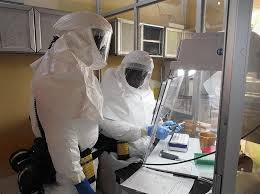Ten scientists from eight major research institutions in the U.S. on Wednesday in New York said they could obtain samples of Ebola, and this had complicated their efforts to understand how the virus was mutating, to develop new drugs, vaccines and diagnostics.
 They said the problems reflect growing caution by regulators and transport companies about handling Ebola as well as the limited resources of West African countries which are struggling to help thousands of infected citizens.
They said the problems reflect growing caution by regulators and transport companies about handling Ebola as well as the limited resources of West African countries which are struggling to help thousands of infected citizens.
A report form the U.S. indicated that Tulane University, one of the institutions, received samples this week, and the U.S. Centre for Disease Control and Prevention (CDC) said it had reached an agreement to get live specimens.
One of the scientists, who spoke on condition of anonymity, said Ebola mutates as it spreads, while few expected it to acquire the ability to transmit through air, for instance.
He said as a result of this, scientists required a constant supply of fresh samples to track these changes.
He said the hold up was not likely to delay the development of experimental treatments, but if the virus undergoes significant changes that go undetected, the drugs and tests might not work.
Dr Charles Chiu, Microbiologist and infectious disease expert at the University of California, San Francisco, said he needed samples from Ebola patients to develop a new genetic test that could detect the disease in infected individuals before symptoms appear.
“No one really knows right now what has the virus mutated to or if it has mutated,” he said.
“Without that research, “we’re not going to be able to determine in advance whether or not it has changed to a form where it might evade diagnostic assays or might render current vaccines or drugs ineffective,” he added.
Laurie Garrett, Senior Fellow, Global Health at the Council on Foreign Relations in New York Scientists, said Liberia, Guinea and Sierra Leone had been slow to release samples as they fight to contain the worst Ebola outbreak on record.
She said the issue was largely and appropriately, about safe transport, especially in the wake of the recent mishandling of pathogens such as anthrax at U.S. government laboratories.
“All the companies working on vaccines, diagnostics and treatments are complaining about lack of access to viral samples of Ebola,” she said.
Erica-Ollmann Saphire of the Scripps Research Institute in La Jolla, California, directs scientists working on Ebola treatments, such as the three-antibody cocktail ZMapp, said she needed special cells from Ebola survivors but had not been able to get any.
Also Dr James Crowe, Director of the Vaccine Centre at Vanderbilt University, was collaborating with Mapp on ZMapp, and has had problems as well.
Crowe said he may soon get some samples from U.S. Ebola survivors through Emory University, after going to great lengths to get them.
Another researcher said exporting the samples from Sierra Leone required approval from an ethics committee, the minister of health and the president.
He said on the U.S. side, importing samples of Ebola required a permit from the CDC and passage through U.S. customs.
“The researchers have switched shipping companies after one refused to carry Ebola, missed a flight which did not have room for cargo,’’ he said.
“He has to bring dry ice to Africa to pack the samples, which were killed with a double shot of an inactivating agent, plus a shot of ethanol for good measure,’’ he added.
He said they are trying to extract RNA from the samples and ship them to collaborators at Harvard University and the Broad Institute, which plan to sequence the genetic code of the virus and track the mutations taking place.
Garry another expert, said he and several dozen colleagues from Harvard and Sierra Leone found that Ebola was mutating twice as fast in humans as in fruit bats which carried the virus.
He aid their last sample was from June, and it was not clear what changes have occurred in the virus since then.
“You need to know how much of an adaptation the virus is making in people,” if you want to treat and diagnose it, he said.
CDC spokesman Tom Skinner said that the agency has struck agreements with the three affected countries in West Africa and hopes to acquire live specimens in a matter of weeks.
He said they would then share samples with other institutions.
“How much sharing will go on will depend on how many specimens we receive and finalising details around getting permission to share from the affected countries,” he said.
Thomas Geisbert, a microbiologist at the University of Texas Medical Branch, said lack of access to African samples has also caused a scramble for blood samples from the handful of U.S. patients who have survived, including Dallas nurse Nina Pham who treated Duncan,.
He said he has a 26 million dollar grant from the National Institutes of Health to study experimental Ebola treatments.
Geisbert said worked with leading Ebola drug developers Profectus BioSciences and Tekmira Pharmaceuticals Corp and is collaborating with Crowe at Vanderbilt for a next-generation antibody treatment for Mapp.
















